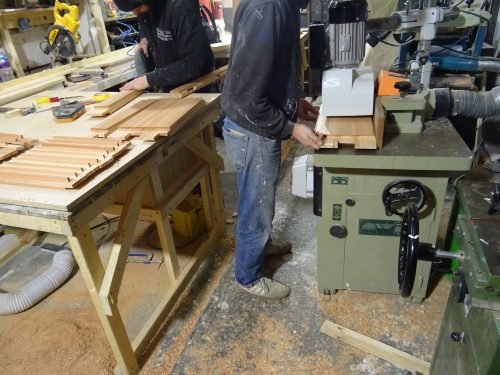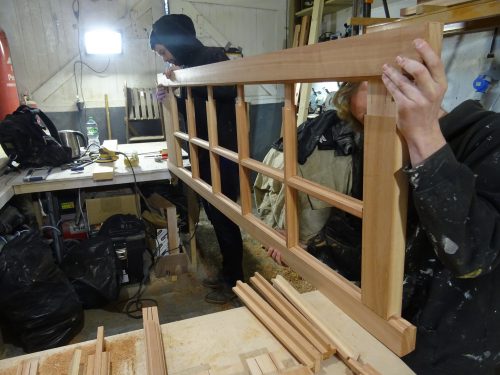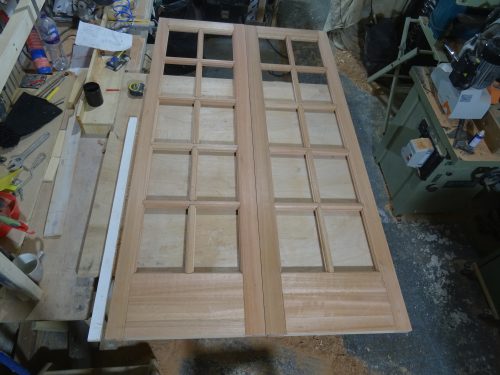Sussex Sash Window Restoration Bespoke replacement windows and doors
SSWR is one of the only companies that are registered to install new replacement windows under the Certass and Fensa certification.
Our company believes in doing everything in-house, were we have complete control of timescales. Supply is one main issues that companies have on waiting times for the products to be made.
We have invested thousands in our own joinery workshop that can produce anything that we require. From the time of the order to when we install, stocks are constantly monitored. When stock levels are low, we send an employee directly to the sawmill to look at the wood. This means that we can cut down on waste and this in-turn we can pass onto the customer.
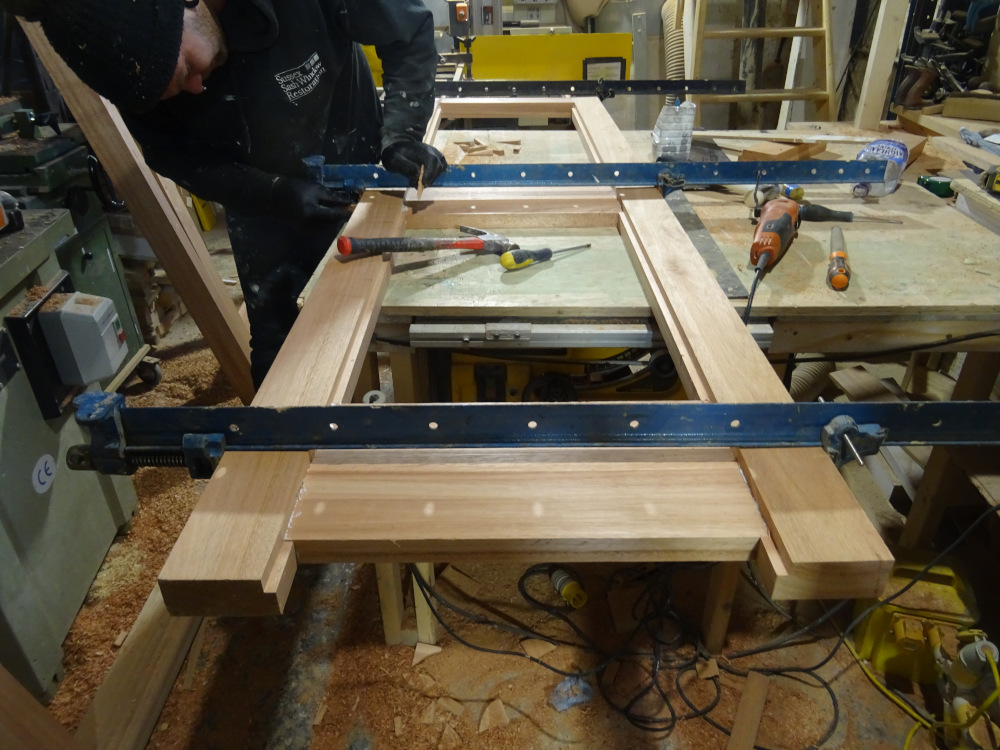
Hardwood timber species
When we look at the wood, we look for a beautiful straight grain, no nots and natural defects. If the timber is not correct when it is climatizing in the workshop this can cause warping of the timber and cracking. We use different types of timber from joinery grade pine, southern yellow pine Utile, Red-Grandis, Meranti, Oak and Accoya.
Accoya is not one of our favourite woods as all woods carry a certain amount of acetic acid (ethanoic acid) or (Glacial acid). Vinegar is 4% acetic acid and the rest is water, it is also used to make polyvinyl acetate and cellulose acetate. It is an organic compound and classed as a week acid that is very corrosive and can be harmful to the skin.
Accoya is it as good as people say even though it has the best durability.
Accoya is modified softwood and the free hydroxyl groups have been changed to around 80%. This means that the wood cells will not soak up the water and expand and contract through the seasons. Remember that wood is formed from dead cells even on living trees. The living cells on a tree are on the outside of the tree namely the bark (skin), inner and outer Cambial layer which is just below the bark. Cambial hardening is what creates the wood itself on the inner part of a tree. This is only a vessel to carry water to the rest of the tree and support the living parts.
So basically, Accoya gets structurally changed were the empty sells are altered and not able to take in the water that they used to. This in-turn makes it hard for fungus and insects to feed on the timber as they would need water. Which I suppose is good, but the downside of this is that it has the highest acidity level of any wood.
This means that you must watch what products you use with this type of wood. Especially when it comes to the window furniture which would have to be stainless steel. It is also recommended that end grains are also sealed with a sealer. A door made from Accoya needs the locks need to be coated with PTFE spray, Epoxy resin or end grain sealer. Fixtures are housed into the stile of the door, notched drilled etc. you are leaving them open to acid attack. So, to our company is this really a good timber to use when so many things can go wrong, hmmmm.
What material do we make our windows from
Well that is a very good question which is the best wood to use. Since we deal with old buildings the timber that was used in them days was Douglas-Fir. This is a grade 3 timber on the timber durability scale. We looked at the same sort of grade timber that is dense and has a beautiful tight grain. we found that our wood of choice was a timber called Utile and is the best alternative. This is a great timber to use and comes in quite nice big stock sizes and stable. This is perfect for the Regency properties of the Sussex coastline which has bigger windows than the later Victorian sashes. It is a very stable, so less movement occurs and warping after it is out in the elements.
This timber machines up great, with less splitting of the timber when the grain has gone in a different direction. This will give the perfect finish to any window and a beautiful result. Softwood is a class 5 timber which is a non-durable product or a perishable and only good for 1- 5yrs. This is one of the reasons that we don’t like just ripping anything just because its quicker. If you are going to replace the windows, then it should always be hardwood. Which also comes with a 10yr guarantee.
Fensa and Certass registration
Fensa and Certass are the two governing bodies that control these regulations in England and wales.
SSWR is a Certass registered company, qualified to survey and install all new installations into private dwellings. Self-certificate the windows and doors under the competent person scheme with a full 5 – 10yr guarantee with QANW.
To become an approved company, you must be competent in the field of surveying/ installing windows to building regulations standard. There are strict vetting procedures that some companies do fail. This can be due to the workforce not being knowledgeable in the regulations and guidelines that we must follow.
new installation comes under Building Regulation Document L 1b. This states all new replacement windows and doors should meet a minimum U-value of 1.6 since April 2002. This is slightly different with listed properties which may only need to reach a U value of 1.9 on Heritage Slimlite glazing. With a total measurement of 12mm thickness on the construction of the units depending on which council you fall into.
Without the appropriate certification that you need to get the windows signed off. it could be very hard to sell the property in the future without this. With the new buyer instructing a surveyor to look at the property and its defects. The mortgage company could refuse to grant a mortgage to the property in question. All new window installations are always uncovered by a trained surveyor especially in an old building.
We can mimic any design of window and door made from any period.
Sussex sash Window restoration can mimic and design that people have made in the past. One thing about listed properties is that you cannot put in any design you like. They must be exact or sympathetic to the building that they are to be installed in. We realised this, and we thought of the cost of producing different moulds to create the exact replica. So we looked into this and purchased a mould cutter profile machine. This creates a perfect cutter for any door for our industrial spindle moulder and 3 headed tenoner machine. This in-turn cuts down the time of production by 10 days if we must send off to Whitehills tooling. This is especially vital when conservation officers are involved with your project or you are a listed property that needs everything to match to the exact detail 100%.
Workshop facilities in Portslade.
SSWR have their own workshop that is just for our company which has a walk-in policy. This is at 1-3 church road, Portslade, East Sussex. We show customers what we produce and show them round so you can see some of the products being made or restored. The machinery that we have is:
- Industrial planer thicknesser.
- table saw.
- Spindle moulder.
- 3 headed tenoner.
- Profile cutter autogrinder
- Spray Booth.
- Glazing area
Come and see us work
So, nothing leaves our property when our company has been instructed to complete your project. We look forward to hearing from you about any future projects that you would like us to be involved with….
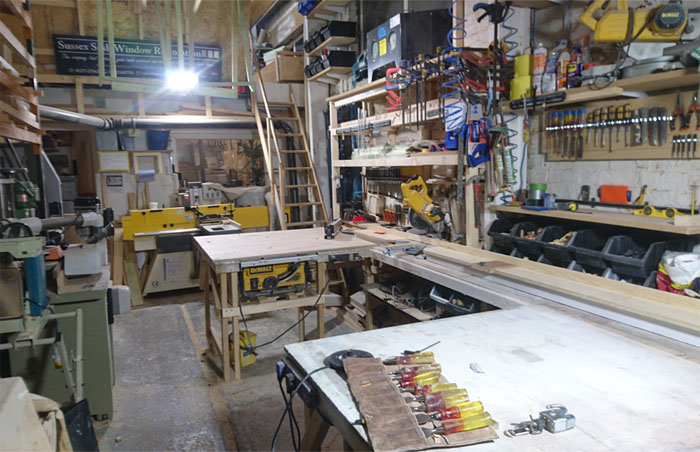
we cover the following areas: Brighton and Hove, Lewes, Hassocks, Haywards Heath, Burgess Hill, Crawley, Gatwick, Uckfield, Seaford, Cuckfield, Eastbourne, Pevensea, Hastings, Shoreham, Horsham, Worthing, Pulborough, Chichester, Arundel, East Sussex and West Sussex


